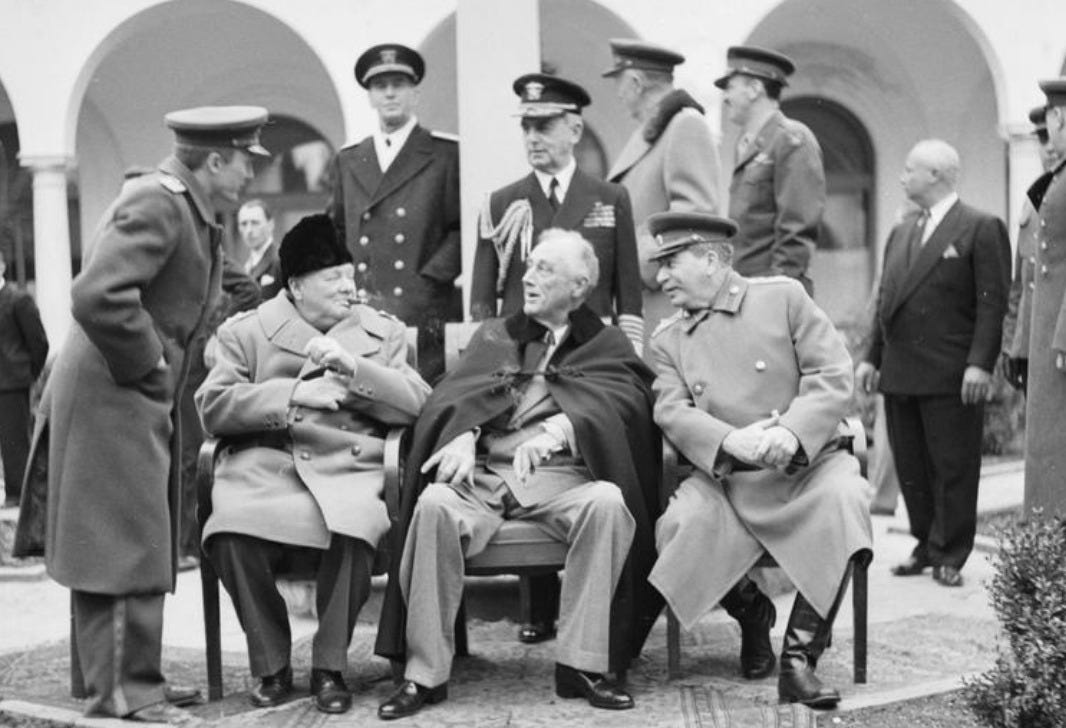Vance and Hegseth Upset the Oompa-Loompas
Stating what should be obvious causes meltdown. Also: John Yoo on presidential impoundment as Pentagon signals major reform.
Vice President JD Vance visited the annual Munich Security Conference hootenanny of globalist, America-last Atlanticists and did something no senior-level American has done there in memory: told the unvarnished truth.
Gone was the fiction that NATO today is a successful alliance or that we share values with the postmodern elite that runs much of Europe— increasingly without the consent of the governed.
Instead, Vance exposed moves by the European elite to cancel elections or censor dissent in Romania, Britain, Sweden, and Germany. Most damning was his assessment of the overall (failed) European project:
And unfortunately, when I look at Europe today, it’s sometimes not so clear what happened to some of the Cold War’s winners. I look to Brussels, where EU commissars warn citizens that they intend to shut down social media during times of civil unrest the moment they spot what they’ve judged to be, quote, “hateful content.”
Speaking of jihadist attacks in Europe and the incompatibility of certain immigrants with what used to be European society, Vance said:
How many times must we suffer these appalling setbacks before we change course and take our shared civilization in a new direction? No voter on this continent went to the ballot box to open the floodgates to millions of unvetted immigrants.
Overall, Vance’s tone conveyed the same polite, happy warrior persona we saw during the campaign and in interviews with insufferable propagandist reporters since then. So were his parting words, which while technically supportive in fact marked the end of something between the USA and decaying Europe:
Good luck to all of you. God bless you.
My preferred translation: “Buh-bye mooching, pointless, post-modern, atheist liabilities who look down your noses at Americans while falsely claiming to share our values and expecting us to finance your defense as you screw us on trade. Give us a call if you elect AfD, National Rally, or UK Reform—a sign you are willing to defend your culture—but otherwise, “Via con Dios.”
Read the Veep’s full speech here.
Hegseth Shocks People With Basic Facts
Secretary of Defense Pete Hegseth didn’t even bother with the hootenanny in Munich. Instead, he went to NATO headquarters in Brussels and stated some obvious facts about Ukraine and U.S. policy to end the Ukraine War:
Everything is on the table in negotiations with Russia to end the Ukraine War.
It is unrealistic for Ukraine to regain its 1991 borders (unspoken: which would require Russia ceding what it has gained on the battlefield, including Crimea, which was a part of Russia from 1783-1991 and again since 2014).
Ukraine will not be a part of NATO (unspoken: we’re not signing up for automatic World War III with Russia over a place with no vital U.S. national interests at stake).
No U.S. troops in Ukraine (see above re WWIII).
The Oompa-Loompas were upset. Kaja Kallas, the European Union’s top diplomat who isn’t quite yet forced to wear a hijab, said, “It is clear that any deal behind our backs will not work. You need the Europeans, you need the Ukrainians. Why are we giving [Russia] everything they want even before the negotiations have started?”
Those three assertions and one question are all mendacious. So is the “we” since Kallas and the EU aren’t part of “we,” useless as they are. The Trump administration has called on Europe to step up—yet another chance to defend its people, its culture, and its honor—but we all know it will fail. Europe is a joke—useful only for vacations and second-rate wine—and everyone honest knows that the war must end with a negotiation between the USA and Russia that is imposed on Ukraine. Hegseth just stated the obvious based on battlefield reality and what a blind man can see about politics in Europe and the United States.
Lithuania’s defense ministerette said Trump-Putin negotiations were a “deadly trap,” adding that the Oompa-Loompas must “embrace our own economic, financial, and military capacity. And we will be the ones who will be deciding what will happen in Europe and in Ukraine.” A digression: Lithuania, like the rest of the Baltics, are indefensible from a determined Russian surge from the east, something the Red Army taught the Nazis decisively in 1944-1945. The Russians can also turn the Baltic itself into a turkey shoot (see also 1944-1945), thwarting U.S. naval power due to the tyranny of geography. These are some of many reasons it was a mistake to admit the Baltics to NATO, and why NATO is an obsolete paper tiger: no one believes Americans will die to seriously defend the Baltics and incur war with Russia. Yet, Lithuania prides itself on antagonizing Russia and China—writing checks that young Americans and our Treasury would have to cash. This is a poor choice.
Not to be out-Oompa Loompa’d, Senator Richard Blumenthal (D-Connecticut), whom President Trump has called “Da Nang Dick” since he fabricated service in the Vietnam War and for some reason is still allowed to be on the Armed Services Committee, moaned:
Surrender & betrayal—this SecDef Hegseth message amounts to abandoning Ukraine, & undercutting the security of our European allies. Having made 6 visits to Ukraine during its fight against Putin’s bloody assault, I know Ukrainians’ courage is unquenchable. They will persevere.
Hooray for them Da Nang Dick. I’m sure if you had visited Vietnam six times during the war instead of zero, the ARVN would have won. But they didn’t, and the reality-check Hegseth and other Trump officials are offering is actually the last best chance to save Ukraine from a (very) gradual Russian advance into the region. As Danny DeVito’s character said in Other People’s Money, “I’m not your best friend. I’m your only friend.”
Notably, Hegseth did not state the other obvious truth that is out there, which Trump did say: Ukraine “may be Russian some day.”

As a reminder that fearless Da Nang Dick and his fellow Democrats are not alone in the Washington Uniparty that has blindly walked us to the brink of war with Russia while losing another decade that should have been spent reorienting U.S. defenses to deter the critical threat posed by China, Senator Roger Wicker (R-Mississippi), chairman of the Armed Services Committee and guarantor of federal pork to shipyards in Mississippi (a century of federal pork and the state is just about last in everything!), jumped in saying he was “puzzled” by Hegseth:
[He] made a rookie mistake in Brussels and he’s walked back some of what he said but not that line. I don’t know who wrote the speech — it is the kind of thing Tucker Carlson could have written, and Carlson is a fool… Everybody knows … and people in the administration know you don't say before your first meeting what you will agree to and what you won't agree to.’
Why do Senate Republicans have boy Liz Cheney running the Armed Services Committee and echoing the failed Biden-globalist Europe-first foreign policy in Munich?
Luckily Wicker and Congress will have no role in Trump’s negotiations with Russia to achieve peace. A comprehensive deal will require removal of some sanctions that Congress has enacted on Russia, but Trump can cite his constitutional authority to conduct foreign policy to waive those if necessary (certainly Biden declined to enforce congressionally enacted sanctions on Iran). But Wicker’s neoconservative globalism is a sign of a bigger problem with Congress. Two other problems are Senator Susan Collins (R-Maine), who is chairman of the Appropriations Committee, and Mitch McConnell, the dotard who was Republican Senate leader for about two decades too long, who placed himself atop the Appropriations subcommittee that oversees the Pentagon in the current Congress.
Hegseth is off to a strong start, but his real test will not be his contribution to foreign policy directly, but his contribution to national power by transforming the U.S. military.
Bloomberg reported that Hegseth is planning to instruct the military to find 8% in cuts to current programs for the Fiscal Year 2026 budget being assembled in order to create funding for yet-to-be-determined new systems. This would be a good start, but only a start.
Even before the lessons of the Ukraine War became clear, analysts predicted that swarms of low-cost drones with shaped charges, guided by nearly persistent monitoring by mesh networks of satellites in low-Earth orbit, could sink or keep away the aircraft carrier groups around which U.S. naval power is built. Separately, enemy missile defenses will decrease the efficacy of U.S. ballistic missiles and U.S. nuclear deterrence along with it. The poor performance of North Korean soldiers in Russia and Ukraine shows that the U.S. Army‘s troop presence in South Korea is about as costly and pointless as its troop presence in Europe. Russian cruise missiles that go mach 17 demonstrate the obsolescence of manned, subsonic bombers like the $800-million-a-copy B-21 the Air Force is currently procuring. America’s lack of on-orbit space weapons is a huge missed opportunity.
Doodling with 8% of the Pentagon’s budget won’t fix this critical problem. Major existing systems need to be cut, perhaps beginning with those manufactured in Wicker’s home state. Not only should Trump and his aides put forth a radical, transformational vision in his defense budget request, he should threaten to impound—or not spend—funds allocated for obsolete weapons or deployments. This is a power presidents had and used frequently before a Watergate-weakened President Richard Nixon signed the unconstitutional Impoundment Control Act of 1974.
Especially in the realm of national security and preventing waste, a president is on strong footing to impound funds that have been appropriated by Congress. The precedent was set in 1803 when President Thomas Jefferson successfully declined to spend money appropriated by Congress for fifteen ships that he as Commander in Chief determined were no longer necessary. This is a power worth restoring and a fight worth having: Trump and Hegseth should pick a fight with Congress that can go to the Supreme Court and restore the president’s power to impound funds.
In the following clip of a podcast, former U.S. official and leading legal scholar John Yoo discussed the matter with Mark Simon and me.
Bigger Defense Cuts
The cuts that Hegseth and DOGE might instigate are noteworthy for another reason. The standard Republican method of restoring military power after it has been run down by a Democrat president is to throw money at the Pentagon. This is what Trump and a Republican Congress did during his first term, increasing the defense budget from $587 billion when Trump took office to $692 billion by Fiscal Year 2018, which began eight months into the first Trump administration.
This method of improvement is increasingly difficult for a country with $29 trillion in debt held by the public—100% of nominal U.S. gross domestic product. Borrowing money is no longer virtually free. The Treasury was able to issue debt at rates just above 2% for more than a decade. Today, new 10-year notes issued by the government cost it nearly 4.5% annually. As average interest paid on existing U.S. debt, currently 3.3%, climbs rapidly toward today’s higher rate, an until new deficit spending is halted, interest payments will consume more of the federal budget not earmarked for Social Security and Medicare. Most likely, the defense budget will have to be cut, not increased. Certainly it should—as should all federal spending outside of Social Security and Medicare.
The aforementioned Senator Wicker wants a $55 billion increase to the Pentagon just for the fun of it. Trump seems to sense that pouring more money into a broken system will just lead to waste. He also became perhaps the first Republican president since Dwight Eisenhower to muse about not merely trimming defense spending but conducting a wholesale realignment:
At some point, when things settle down, I’m going to meet with China and I’m going to meet with Russia… and I’m going to say there’s no reason for us to be spending almost $1 trillion on the military... and I want to say let’s cut our military budget in half.
Keeping Score
Conservative media seems to have come around to the Trump positions that the Ukraine War should end, that no vital U.S. interests exist in Ukraine, that Europe should pay for its defense, and that there is a strong U.S. national interest in not pushing Russia farther into China’s arms.
This is quite a switcheroo from the first years of the war when so many Republican military analysts and Pentagon reporters’ only criticism of Biden’s Europe-first foreign policy was that he was not doing enough to fight Ukraine’s war. Oddly, this group even included former Trump administration officials who seemed unable to define “America first” or invariably attempted to define it as a negative (“America first is not America alone”) as they urged war with Russia via the Ukraine sideshow. A finishing touch was triumphalist predictions that Ukraine would prevail on the battlefield and even that Russian President Vladimir Putin would be deposed.
Out of curiosity, I wonder if anyone had a contrarian view?
The video above is from March 2022. Some of my other media on Ukraine:
Russia Russia Russia: Washington's stupidity and self-indulgence has made war more likely (January 2022)
Putin Thinks We Are a Bunch of Karens (February 2022)
Republican war hawks share blame with Biden for high gas prices (March 2022)
Biden Puts Europe First and America Last (March 2022)
Congress Should Reject Biden's $33 Billion for Ukraine (April 2022)
Is Liz Cheney a Russian Agent? (April 2022)
How the Next President Can Unload the Ukraine Failure (August 2023)
This NATO alliance is 'losing': Christian Whiton (July 2024)
Audit the IRS
On Sky News Australia, I discussed the plan for DOGE to audit the IRS and early success of Trump’s immigration efforts.
Yalta at Eighty Years
I recently participated in a panel of the Moscow-based Valdai Discussion Club about the 80th anniversary of the 1945 summit of Franklin Roosevelt, Winston Churchill, and Joseph Stalin at Yalta. My remarks below (edited) touched on lessons the conference holds for Ukraine, Russia, and the United States today. Was FDR just putting America first?
Thank you for the introduction and for inviting me to participate in this most interesting session by the Valdai Discussion Club.
As a right-wing American who formed his political views during the Reagan-Bush era of Cold War confrontation and later during the unipolar moment after the end of the Cold War, “Yalta” was often a dirty word to me.
To many cold warriors, it was the place where an ailing Franklin Roosevelt, the onetime political master of the century who was in fact just two months from his death, and who was in a state of naivety about the duplicity of Soviet leader Joseph Stalin, gave away Poland and the rest of Eastern Europe to Soviet control.
This simplified version of events implied a betrayal that meant it was the responsibility of the United States and the rest of the West to help liberate Eastern Europe and curb Soviet domination. It even affects those today who say that the United States must pay to defend Europe.
Defenders of Roosevelt observed the reality that a Soviet Union with a massive army would never simply pick up and leave what it had gained, especially given the immense sacrifices of the Soviet Union during the war.
Furthermore, while Germany appeared all but defeated, the war with Japan was far from settled. In February 1945, as the Allies met at Yalta, nuclear weapons were still only theoretical. The successive incineration of Japanese cities by U.S. fire bombing raids had only begun to show success that very month after prolonged failure—but this breakthrough was not yet obvious to the leaders. The invasion of the main Japanese island of Honshu, which includes Tokyo, wasn’t planned until March of 1946. Roosevelt was understandably eager to secure Soviet participation in the fight against Japan—which Stalin offered at Yalta.
Did Roosevelt not simply put the priorities of his own country’s national security at the front of his agenda as any normal leader would do—what today, many of us on the New Right in America might call “putting America first?”
And yet the question remains whether Roosevelt and British Prime Minister Winston Churchill could have gotten a better deal from the Stalin. Was the Red Army at the peak of its power or was it near exhaustion? Was the likely success of American air power and the coming of a nuclear monopoly not an ace up Roosevelt’s sleeve that he could have played against Stalin? Could some sort of neutrality not at least be gained for Poland, over which the war in Europe started in the first place?
To ask these questions fits an American view that tragedy is often traceable to a mistake and not an inevitability of history. Of course, these are questions that can never be answered with finality—which is why we still ask them eighty years after the event.
Then the question shifts to what can be learned from Yalta. Were the three meetings of the “Big Three”—Tehran, Yalta, and Potsdam—not imperfect but successful diplomatic events that secured victory over the Axis?
Try as we might, it is difficult not to see history through the lens of the time in which we live. Today, there has been war in Europe since Russia invaded Ukraine. The Pacific is not in crisis, but a looming confrontation between China and the United States and its allies never seems far. In the United States, an historically reelected President Trump is unbounded by the past’s unwritten rules of engagement and deference to foreign policy experts who have prevented any serious diplomatic effort to end the fighting. Can high-stakes, top-level diplomacy like that which occurred at Yalta again secure a future that, while far from perfect, is nonetheless preferable to the present?
I think the answer is “maybe,” but it is worth trying. We are not here to discuss solely the Ukraine war, but of course it would be central to any high-stakes meetings between the leaders of the United States and Russia. My own view is that a solution will elude Ukraine for perhaps several years. But presidential-level engagement that transcends bureaucracies and brings together people who can actually make decisions is worth the effort and has little downside.
And Yalta teaches us that the end is not ultimately the end. Yes, the summit accepted a Soviet sphere of influence that meant millions of Eastern Europeans would suffer from tyranny similar to that which existed in the Soviet Union. But ultimately that would change in Europe and Russia. Summits like Yalta make sense when they are viewed as important waypoints in a long journey rather than final acts.









